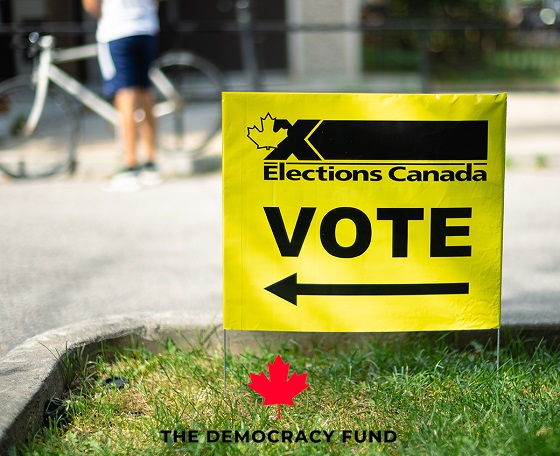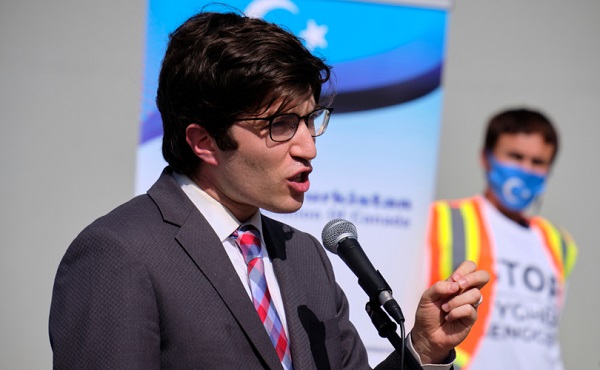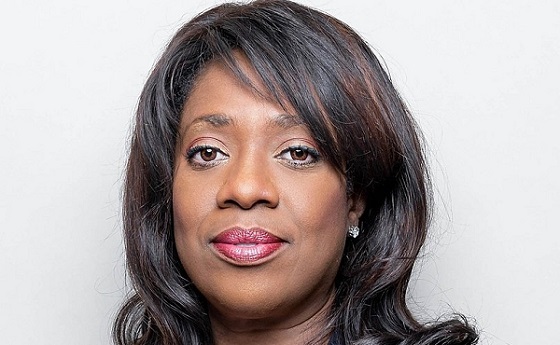Alberta
TDF expresses concern over Election Canada’s new mis/disinformation policy

From The Democracy Fund

Written by TDF’s Legal Team
The Democracy Fund sends a letter to Elections Canada and Minister LeBlanc.
Elections Canada has recently developed a policy to monitor and dissuade the publication of “misinformation” and “disinformation.”
In January 2024, it launched its ElectoFacts website to provide “correct information about elections that Canadians can easily access.” Elections Canada claims that it does not intend to establish Elections Canada as “the arbiter of truth” that will actively monitor the accuracy of statements and information distributed by parties and candidates.
However, The Democracy Fund (TDF) fears that the ambiguous language and the apparent lack of legislative authority to engage in such an endeavour will lead to an expansion of the program. Elections Canada has also contacted social media companies to remove “inaccurate” information: this is troubling because it is arguably an infringement of free speech rights, and there appears to be no judicial oversight of this censorship.
Canadians have the right to criticize their government and its processes – even if this criticism is wrong, inapt, trivial, unfair or unjustified. Efforts by the Western governments to constrain criticism using fashionable terms such as “misinformation” or “disinformation” are just state censorship rebranded for modern audiences.
TDF outlined its concerns in a letter to the Office of the Chief Electoral Officer and the Minister of Public Safety, Democratic Institutions and Intergovernmental Affairs, Dominic LeBlanc.
Our letter is attached below.
February 9, 2024
via email
Stéphane Perrault
Acting Chief Electoral Officer
Office of the Chief Electoral Officer
Elections Canada
30 Victoria Street
Gatineau, Quebec
K1A 0M6
Dear Mr. Perrault,
Re: Elections Canada Misinformation/Disinformation Monitoring
We are a civil society organization and registered charity that defends and promotes civil liberties in Canada. We are writing to express our concerns regarding comments around election “misinformation” and “disinformation” on the Elections Integrity and 1 ElectoFacts website.2
On its Election Integrity website, under “Disinformation or Influence Campaign,” Elections Canada outlines several types of objectionable conduct, namely:
- Elections Canada: Influence campaigns aimed at discrediting parts of the electoral process.
- Political Parties/Candidates: Social media campaign to spread false information about a candidate.
- Electors: Foreign online campaign aimed at specific diaspora communities to influence their vote.
In addition, Elections Canada purports to monitor the “information environment” (the news media, the Web, social media, etc.) to detect:
- Incidents that could affect the smooth administration of a general election or by-election;
- Inaccurate information on the electoral process, which could prevent people from exercising their rights to register, vote or be a candidate; and,
- Social media accounts and websites that impersonate Elections Canada, which could lead to confusion.3
We note that Elections Canada has previously contacted social media companies – including Facebook, Twitter, Google, Snapchat, LinkedIn, Reddit, YouTube, TikTok, and Instagram:
- Elections Canada (EC) engages with digital platforms that have a significant Canadian presence as well as those that have reached out to EC.
- For the 44th general election (GE44), EC worked with Facebook/Instagram, Google/YouTube, Twitter, LinkedIn, Snapchat, and for the first time, TikTok and Reddit, to establish protocols for reporting cases of false information on the voting process and impersonation of EC.4
The purpose of this contact was to report online content to these platforms and, presumably, have them remove “false information.” This was done without prior judicial oversight and review.
There are a number of problems with this approach to monitoring online information.
First, it is not clear that Elections Canada has the legislative authority to report citizens or their online comments, or attempt to influence platforms to remove “false information.” Even if it did, doing so without judicial review and oversight is arguably improper.5 Where there was authority to regulate “false statements” in the Canada Elections Act6 (“the Act”), we note that the court, in Constitution Foundation v. Canada (Attorney General), held that s.91(1) of the Act breached s.2(b) of the Canadian Charter or Rights 7 and Freedoms.8
Importantly, the legality of prohibiting the publication of “false news” has been adjudicated by Canadian courts, and the relevant Criminal Code provisions have been 9 struck down.10
Second, the ability to identify “misinformation” and “disinformation” requires resolution of one of the most difficult problems in epistemology. Simply put, an assessment of the truth of a statement engages the central questions of epistemology: what is meant by the claim that a statement is true, and under what authoritative conditions can one be certain that a statement is true (“the Epistemic Problem”). This Epistemic Problem has bedeviled philosophers for millennia, and remains unresolved. Until such time as it is resolved, claims to epistemic certainty are unfounded.
There is no evidence that Elections Canada has resolved the Epistemic Problem. It cannot, therefore, arrogate to itself the required certainty on matters of truth or falsehood.
Third, we note that the language used by Elections Canada regarding “false information” is ambiguous. Linguistic ambiguity allows for expansive regulatory powers. Further, the language used does not allow for “false information” that is comedic, parodistic or satirical. As a result, removal or attempted removal of “false information” will be overbroad and imprecise.
Fourth, given the concerns outlined above, it is not clear that Elections Canada could implement any process that would be better at ascertaining truth than citizens using normal human discernment.
Consequently, any removal or attempted removal of “false information” will be an exercise in either arbitrary or politically-motivated censorship. This is particularly troubling because the type of “false information” that attracts attention usually relates to contested or controversial political and moral statements, rather than trivial falsehoods.
Worse still, in our experience, punishment for contravening speech laws is typically inflicted upon minority communities, vulnerable groups and political dissidents: those with privilege avoid sanction.
Finally, attempts to remove “false information” will ultimately result in the erosion of civil liberties and democratic engagement. The reduction in exposure to moral and political information – both true and false – prevents citizens from engaging with complex arguments, and, thereby, diminishes their critical-thinking capacity. For, if the information expressed was correct, participants would have gained the benefit of exchanging their wrong information for correct information. If the information expressed
was wrong, participants would have gained the benefit of intellectual justification for their beliefs, without which they possess not knowledge, but dead dogma.11
For these reasons, we would respectfully recommend that Elections Canada restrict its conduct to publishing factual information about elections and the electoral process. It is safer and more practicable for the citizens as Canada to remain the arbiters of truth.
As always, we would be pleased to meet with you to discuss our concerns and any questions you may have about our position.
Regards,
Mark A. Joseph
Senior Litigation Counsel
c.c.: Minister of Public Safety, Democratic Institutions and Intergovernmental Affairs
- Election Integrity and Security Including Foreign Interference
- ElectoFacts
- Supra, note 1.
- Agreements with social media platforms to address inaccurate information
- Little Sisters Book and Art Emporium v. Canada (Minister of Justice), [2000] 2 SCR 1120
- Canada Elections Act, S.C. 2000, c. 9
- Constitution Foundation v. Canada (Attorney General), 2021 ONSC 1224
- Canadian Charter of Rights and Freedoms, s.7, Part 1 of the Constitution Act, 1982, being Schedule B to the Canada Act 1982 (UK), 1982, c 11 a
- Criminal Code, RSC , 1985, c. C-46
- R. v. Zundel, [1992] 2 SCR 731
- Chicago. Mill, John Stuart. 2002. On Liberty. Dover Thrift Editions. Mineola, NY: Dover Publications.
About The Democracy Fund:
Founded in 2021, The Democracy Fund (TDF) is a Canadian charity dedicated to constitutional rights, advancing education and relieving poverty. TDF promotes constitutional rights through litigation and public education. TDF supports an access to justice initiative for Canadians whose civil liberties have been infringed by the government lockdowns and other public policy responses to the pandemic.
Alberta
Alberta bill would protect freedom of expression for doctors, nurses, other professionals

From LifeSiteNews
‘Peterson’s law,’ named for Canadian psychologist Jordan Peterson, was introduced by Alberta Premier Danielle Smith.
Alberta’s Conservative government introduced a new law that will set “clear expectations” for professional regulatory bodies to respect freedom of speech on social media and online for doctors, nurses, engineers, and other professionals.
The new law, named “Peterson’s law” after Canadian psychologist Jordan Peterson, who was canceled by his regulatory body, was introduced Thursday by Alberta Premier Danielle Smith.
“Professionals should never fear losing their license or career because of a social media post, an interview, or a personal opinion expressed on their own time,” Smith said in a press release sent to media and LifeSiteNews.
“Alberta’s government is restoring fairness and neutrality so regulators focus on competence and ethics, not policing beliefs. Every Albertan has the right to speak freely without ideological enforcement or intimidation, and this legislation makes that protection real.”
The law, known as Bill 13, the Regulated Professions Neutrality Act, will “set clear expectations for professional regulatory bodies to ensure professionals’ right to free expression is protected.”
According to the government, the new law will “Limit professional regulatory bodies from disciplining professionals for expressive off-duty conduct, except in specific circumstances such as threats of physical violence or a criminal conviction.”
It will also restrict mandatory training “unrelated to competence or ethics, such as diversity, equity, and inclusion training.”
Bill 13, once it becomes law, which is all but guaranteed as Smith’s United Conservative Party (UCP) holds a majority, will also “create principles of neutrality that prohibit professional regulatory bodies from assigning value, blame or different treatment to individuals based on personally held views or political beliefs.”
As reported by LifeSiteNews, Peterson has been embattled with the College of Psychologists of Ontario (CPO) after it mandated he undergo social media “training” to keep his license following posts he made on X, formerly Twitter, criticizing Trudeau and LGBT activists.
He recently noted how the CPO offered him a deal to “be bought,” in which the legal fees owed to them after losing his court challenge could be waived but only if he agreed to quit his job as a psychologist.
Early this year, LifeSiteNews reported that the CPO had selected Peterson’s “re-education coach” for having publicly opposed the LGBT agenda.
The Alberta government directly referenced Peterson’s (who is from Alberta originally) plight with the CPO, noting “the disciplinary proceedings against Dr. Jordan Peterson by the College of Psychologists of Ontario, demonstrate how regulatory bodies can extend their reach into personal expression rather than professional competence.”
“Similar cases involving nurses, engineers and other professionals revealed a growing pattern: individuals facing investigations, penalties or compulsory ideological training for off-duty expressive conduct. These incidents became a catalyst, confirming the need for clear legislative boundaries that protect free expression while preserving professional standards.”
Alberta Minister of Justice and Attorney General Mickey Amery said regarding Bill 13 that the new law makes that protection of professionals “real and holds professional regulatory bodies to a clear standard.”
Last year, Peterson formally announced his departure from Canada in favor of moving to the United States, saying his birth nation has become a “totalitarian hell hole.”
Alberta
‘Weird and wonderful’ wells are boosting oil production in Alberta and Saskatchewan

From the Canadian Energy Centre
Multilateral designs lift more energy with a smaller environmental footprint
A “weird and wonderful” drilling innovation in Alberta is helping producers tap more oil and gas at lower cost and with less environmental impact.
With names like fishbone, fan, comb-over and stingray, “multilateral” wells turn a single wellbore from the surface into multiple horizontal legs underground.
“They do look spectacular, and they are making quite a bit of money for small companies, so there’s a lot of interest from investors,” said Calin Dragoie, vice-president of geoscience with Calgary-based Chinook Consulting Services.
Dragoie, who has extensively studied the use of multilateral wells, said the technology takes horizontal drilling — which itself revolutionized oil and gas production — to the next level.
“It’s something that was not invented in Canada, but was perfected here. And it’s something that I think in the next few years will be exported as a technology to other parts of the world,” he said.
Dragoie’s research found that in 2015 less than 10 per cent of metres drilled in Western Canada came from multilateral wells. By last year, that share had climbed to nearly 60 per cent.
Royalty incentives in Alberta have accelerated the trend, and Saskatchewan has introduced similar policy.
Multilaterals first emerged alongside horizontal drilling in the late 1990s and early 2000s, Dragoie said. But today’s multilaterals are longer, more complex and more productive.
The main play is in Alberta’s Marten Hills region, where producers are using multilaterals to produce shallow heavy oil.
Today’s average multilateral has about 7.5 horizontal legs from a single surface location, up from four or six just a few years ago, Dragoie said.
One record-setting well in Alberta drilled by Tamarack Valley Energy in 2023 features 11 legs stretching two miles each, for a total subsurface reach of 33 kilometres — the longest well in Canada.
By accessing large volumes of oil and gas from a single surface pad, multilaterals reduce land impact by a factor of five to ten compared to conventional wells, he said.
The designs save money by skipping casing strings and cement in each leg, and production is amplified as a result of increased reservoir contact.
Here are examples of multilateral well design. Images courtesy Chinook Consulting Services.
Parallel
Fishbone
Fan
Waffle
Stingray
Frankenwells
-

 COVID-1913 hours ago
COVID-1913 hours agoNew report warns Ottawa’s ‘nudge’ unit erodes democracy and public trust
-

 Great Reset2 days ago
Great Reset2 days agoEXCLUSIVE: A Provincial RCMP Veterans’ Association IS TARGETING VETERANS with Euthanasia
-

 Health2 days ago
Health2 days agoDisabled Canadians petition Parliament to reverse MAiD for non-terminal conditions
-

 Daily Caller2 days ago
Daily Caller2 days agoSpreading Sedition? Media Defends Democrats Calling On Soldiers And Officers To Defy Chain Of Command
-

 Crime1 day ago
Crime1 day agoHow Global Organized Crime Took Root In Canada
-

 Digital ID2 days ago
Digital ID2 days agoLeslyn Lewis urges fellow MPs to oppose Liberal push for mandatory digital IDs
-

 Business2 days ago
Business2 days agoThe Payout Path For Indigenous Claims Is Now National Policy
-

 Energy1 day ago
Energy1 day agoExpanding Canadian energy production could help lower global emissions













